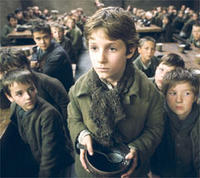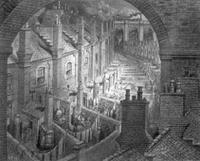Oliver Twist - a Pleasant Surprise.
 Last night, I saw Roman Polanski’s Oliver Twist and, having had no expectation whatsoever, I was pleasantly surprised. The very beginning sets the atmosphere with its Gustave Dore inspired images.
Last night, I saw Roman Polanski’s Oliver Twist and, having had no expectation whatsoever, I was pleasantly surprised. The very beginning sets the atmosphere with its Gustave Dore inspired images.
I also liked the changes made by the writer – some may lament that Fagin ends in prison but the prison scene makes the change worth it and it adds another philosophical dimension on the notion of guilt, forgiveness and punishment. Also, contrary to the original story Oliver is NOT reunited with rich parents which seem to be more fitting in this day and age. The only thing is that it is slow to draw out the emotions you feel when you first read the novel but this may be precisely due to the fact that the story is so universally known that it become shard to be surprised and, moreover we are so constantly emotionally solicited that we may have become a bit num to this kind of story (Been there.. Done that…).
But it is refreshing to be reminded of the old-fashioned thrills of good storytelling anyway, and it is definitely a movie worth taking children of 10 and above. Quite a change from the usual video-like movies marketed for kids.
NOTE: This drawing of Victorian London, by the French illustrator and printmaker Gustave Doré, shows the squalid conditions created for the urban labouring classes by the Industrial Revolution. The Industrial Revolution reshaped the urban environment, not least by concentrating workers in the new industrial towns and suburbs linked and supplied by railways. Doré documented some of the process in his drawings of

1 Comments:
I quite agree with your review of Polanski's Oliver Twist.
Even if "some may lament that Fagin ends in prison", that's the way it goes in Dickens's novel, after all.
Besides, one of the things that should underlined if the absence of references to Fagin as "the Jew", mentioned about 250 times in Dickens's work.
It shows it is possible to avoid anti-Semitic clichés, especially when dealing with films first aimed at children.
Post a Comment
<< Home